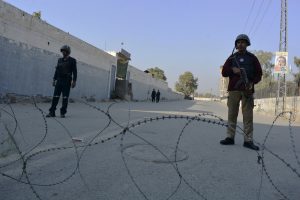The National Security Council (NSC), Pakistan’s principal decision-making body on national security, decided at a meeting on January 2 that “any and all entities that resort to violence” will be dealt with the “full force of the state.”
“Pakistan’s security is uncompromisable and the full writ of the state will be maintained on every inch of Pakistan’s territory,” the Prime Minister’s Office (PMO) said after the meeting.
Amidst a rise in terror attacks, the NSC, which comprises the top civilian and military leadership, has decided that “no country will be allowed to provide sanctuaries and facilitation to terrorists, and Pakistan reserves all rights in that respect to safeguarding her people. ”The NSC meeting, which is the first that General Asim Munir has attended as Pakistan’s Chief of Army Staff (COAS), has brought clarity to Pakistan’s policy towards the banned Tehreek-Taliban Pakistan (TTP) and its enablers.
Since the Afghan Taliban’s takeover of Kabul in August 2021, Pakistan has tried all possible avenues to engage the TTP, including involving tribal leaders, religious scholars and the Afghan Taliban. In this effort, Pakistan also reportedly offered to rehabilitate TTP’s fighters and their families, if the group was ready to abide by the constitution and relinquish its militant structure.
However, Pakistan’s efforts to persuade the TTP have been to no avail as the militant outfit has not only ramped up attacks on security forces but also appears to have expanded its organizational structure across Pakistan.
A government source told The Diplomat on condition of anonymity that “there will be no talks with the TTP going forward and the militant outfit will be dealt with iron hands and firm resolve.” The source also rejected reports that Pakistan was considering another ceasefire with the TTP.
This clarity on Pakistan’s policy regarding the militant outfit comes amid statements from TTP leader Mufti Noor Wali Mehsood that his group is still open to a ceasefire agreement with Pakistan. “We held talks with Pakistan mediated by the Islamic Emirate of Afghanistan. We are still open to the ceasefire agreement,” Mehsood said in a message last week according to Dawn newspaper.
It is important to note that Mehsood had unilaterally ended the ceasefire with Pakistan in November last year and ordered TTP militants to launch attacks on security forces across the country.
It is unlikely that Pakistan will take the bait of agreeing to another ceasefire with the TTP under the new civil-military regime in Pakistan. It is improbable that going forward, Pakistan would merely agree to look for a ceasefire with the TTP with Afghan Taliban’s mediation. This is partially based on the notion that offering talks and ceasefire deals to a militant group that has no interest in laying down weapons only legitimizes its cause. Moreover, this view is largely based on the understanding that Pakistan’s Afghan policy urgently needs a review, particularly with regard to Islamabad’s hopes of expecting support from the Afghan Taliban to contain TTP and other militant outfits. The previous ceasefires have only emboldened the TTP and allowed the Afghan Taliban to “just do enough to fend off pressure from Islamabad,” the government source said.
However, this will not be the case anymore as Islamabad looks to address loopholes in its Afghan policy.
It is expected that Pakistan will ramp up pressure on the Afghan Taliban in cooperation with countries like Saudi Arabia, Qatar and the U.S. to shut down TTP’s sanctuaries in Afghanistan. Moreover, the country may also make it difficult for the Afghan Taliban to secure the international recognition and legitimacy that the group has sought since the Kabul takeover.
Pakistan may not necessarily resort to a military operation inside Afghanistan to root out TTP sanctuaries but the country will surely ramp up counterterrorism operations in tribal areas where concerns for TTP’s return are mounting as the group accelerates its militant campaign.
There appears to be a strong appetite for the military’s deployment, even a large-scale operation in tribal areas to stamp out the TTP. Last week, thousands of people took to the streets in South Waziristan to protest against the recent wave of terrorism. They called on the government to immediately take steps to restore peace in the region. Leaders of the Pakistan People’s Party (PPP), Pashtun Tahaffuz Movement (PTM), Pakistan Muslim League-Nawaz (PML-N) and Awami National Party (ANP) not only addressed rallies but also demanded the deployment of law enforcement agencies to operate abandoned police stations.
As I pointed out in a previous article, Pakistani-U.S. cooperation to confront the TTP in tribal areas and beyond will become a key component of Islamabad’s strategy to deal with the group. While details of the modalities of the expected cooperation between the two sides have not come to light so far, strong diplomatic support from Washington for Pakistan’s case has already emerged. Days after the NSC meeting, the United States threw its weight behind the counter-terrorism decisions taken by Pakistan’s leadership, saying “Pakistan has a right to defend itself from terrorism.”
U.S. State Department Spokesperson Ned Price said that the Afghan Taliban must uphold the commitments it made to halt the use of Afghan soil for international terrorist attacks. “These are among the very commitments that the Taliban have been unable or unwilling to fulfill to date,” he added.
Ostensibly, the NSC’s decision that countering groups like TTP should be the way forward bodes well for Pakistan. However, it remains to be seen how the outlines agreed upon at the meeting translate into work on the ground in the coming days and weeks.
In any case, Pakistan doesn’t seem to be in the mood to make new ceasefires or peace agreements unless these guarantee the disbandment of the TTP and its support base in and outside Pakistan.

































